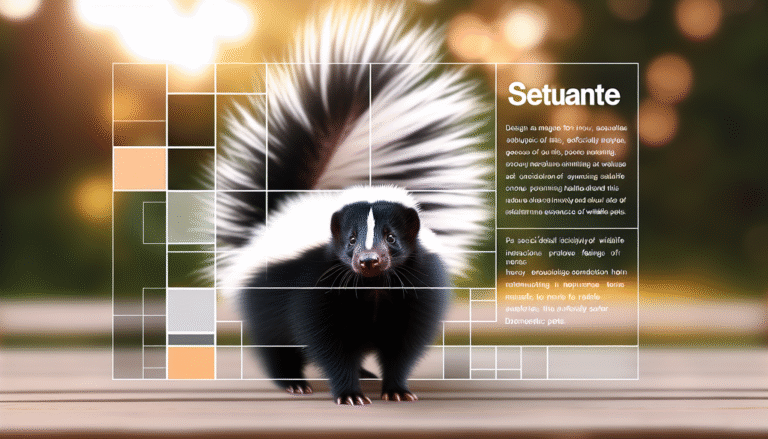What would you do if you found out that a rabid skunk was roaming around your neighborhood? While it may sound unsettling, this was a recent reality for residents in a New Jersey town. Understanding the situation can help you keep your pets safe and inform you about what to do if you ever find yourself facing a similar scenario. Let’s break down the incident and explore everything you need to know about rabies, your pets, and how to protect your animals.
Understanding the Rabies Virus
Rabies is a viral disease that affects the brain and spinal cord of mammals, including humans. It’s most commonly spread through the bite of an infected animal. The symptoms can be quite severe, making rabies a serious public health concern.
How Rabies Affects Animals and Humans
When an animal contracts rabies, it can undergo behavioral changes. This can include aggression, confusion, or a lack of fear of humans. If a human is bitten by a rabid animal, they have a limited time frame—typically just a few weeks—to receive treatment before the virus becomes fatal.
Your knowledge of how rabies spreads and the symptoms it causes is critical for personal safety and for the well-being of your pets.
The Importance of Vaccination
Vaccination is crucial for your pets to protect them from rabies. Most states require rabies vaccinations for dogs and cats, which must be kept up to date as per local laws. Make sure your pet’s vaccination records are accessible in case of emergencies. Also, a simple visit to your veterinarian can clarify any questions you have concerning the vaccination schedules and booster shots.
The Recent Skunk Incident in New Jersey
In Camden County, New Jersey, a skunk that interacted with two dogs was confirmed to have rabies on August 28, 2025. The interaction took place a few days prior, which resulted in immediate action from local authorities.
How the Incident Unfolded
A resident in Gibbsboro noticed a skunk in their yard on August 19, where it came into contact with their two dogs. Understanding the potential risk, the resident promptly alerted authorities. The local Animal Control Officer captured the skunk, and testing later confirmed the rabies infection.
Possible Consequences for Pets
Unfortunately, one of the dogs did not have proof of rabies vaccination. This situation warrants a four-month quarantine for that dog, while the other dog, which had its vaccinations yet may have been exposed, will quarantine for 45 days. In both cases, rabies booster shots were administered to enhance protection.
Human Exposure
Fortunately, there were no reported human exposures associated with the incident. However, the risk can increase if people do not take precautions when dealing with potentially rabid animals. If you have been in close contact with a wild animal that appears sick or disoriented, seeking medical attention quickly is essential.
Understanding Quarantine Regulations for Dogs
Quarantine regulations exist to minimize the risk of rabies spread in areas where an outbreak may occur. For pet owners living in communities where rabies cases have been identified, understanding these regulations is vital.
Quarantine Duration
As mentioned, the duration of quarantine can vary depending on the vaccination status of the pet. Here are some general guidelines:
| Dog’s Vaccination Status | Quarantine Duration |
|---|---|
| Unvaccinated | 4 months |
| Vaccinated | 45 days |
Why Quarantine is Necessary
Quarantine serves to protect both your pets and the community. By isolating potentially exposed animals, the spread of rabies can be effectively contained, preventing further outbreaks and protecting public health.
What You Should Do if Your Pet is Exposed
If your dog, cat, or any pet has been exposed to a wild animal or if there’s suspicion of rabies, taking immediate and appropriate steps can save your pet’s life.
Step 1: Isolate Your Pet
First and foremost, keep your pet away from other animals and people. This helps mitigate any potential spread of rabies if your pet were to be infected.
Step 2: Consult Your Veterinarian
Reach out to your veterinarian. They can guide you on the necessary actions to take, whether that includes vaccinations, booster shots, or urgent testing.
Step 3: Report the Incidence
If your pet was exposed to a wild animal, it’s crucial to report this to local animal control or public health officials. Keeping them informed can help them monitor the situation and provide advice tailored to your area.
Step 4: Monitor Your Pet
Keep a close eye on your pet for any symptoms of rabies over the coming weeks. Behavioral changes, lethargy, or difficulty swallowing are warning signs that should prompt immediate veterinary care.
Community Awareness and Responsibility
As a pet owner, participation in community efforts to keep animals safe is equally essential. Be vigilant and spread awareness about rabies and prevention strategies.
Reporting Suspicious Animals
Let your neighbors know about any wild animals that appear displaced or unwell. Prompt reporting leads to quicker responses and potential control measures by local animal control.
Community Vaccination Drives
Many communities hold vaccination clinics to ensure pets are immunized against rabies. Participating in these events helps not only your own animals but also contributes to the overall health of community pets.
What You Can Do to Protect Your Pets and Family
Apart from vaccination and awareness, other steps can help protect your pets and family from rabies.
Keep Pets on Leashes
When walking your dog or allowing them outdoors, keep them on a leash. This prevents them from wandering into potentially hazardous areas where wild animals may roam.
Don’t Leave Scraps Outside
While it might be tempting to feed stray animals or leave pet food outside, this can inadvertently attract wildlife that may be rabid. Keeping your yard clean minimizes the chances of interaction with wild animals.
Secure Trash Bins
Ensure garbage bins are secured tightly. This will keep raccoons, skunks, and other wildlife away from your property, decreasing the chances of encounters that could pose a rabies risk.
Final Thoughts
Finding out about rabid animals in your area can be alarming, but understanding the situation equips you to keep your furry friends safe. Vaccination and awareness are your best defenses against rabies. Additionally, being a responsible pet owner means more than just ensuring your pets are vaccinated. It involves being vigilant in your neighborhood, educating others, and taking proactive measures to ensure a safe environment for everyone.
In the wake of the skunk incident in Camden County, it’s evident that community cooperation and communication with local authorities can significantly mitigate risks associated with rabies. So, what steps will you take today to ensure the safety of your pets and those around you? Remember, informed pet owners make secure communities.


